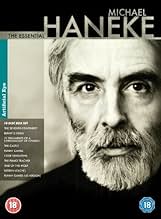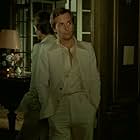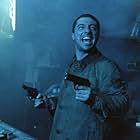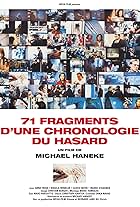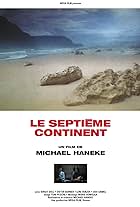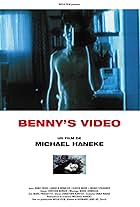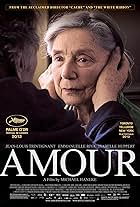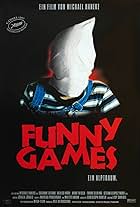IMDb RATING
7.1/10
16K
YOUR RATING
A young man harasses a homeless woman, another man protests, the police arrest both and the woman has to leave the country. What were their various story-lines leading up to this event?A young man harasses a homeless woman, another man protests, the police arrest both and the woman has to leave the country. What were their various story-lines leading up to this event?A young man harasses a homeless woman, another man protests, the police arrest both and the woman has to leave the country. What were their various story-lines leading up to this event?
- Awards
- 1 win & 3 nominations
Josef Bierbichler
- The Farmer
- (as Sepp Bierbichler)
Maimouna Hélène Diarra
- Aminate
- (as Helene Diarra)
Crenguta Hariton
- Irina
- (as Crenguta Hariton Stoica)
Walid Afkir
- The Young Arab
- (as Walide Afkir)
- Director
- Writer
- All cast & crew
- Production, box office & more at IMDbPro
Storyline
Did you know
- TriviaMichael Haneke began the project when Juliette Binoche wrote to him expressing an interest in working with him.
- Quotes
Anne Laurent: Look over by the wall. That's the black kid who harassed Jean. Don't let him see...
[abrupt cut]
- ConnectionsFeatured in Mein Leben: Michael Haneke (2009)
Featured review
Paris, in the year 2000. A thoughtless gesture (a scrap of paper thrown in the hands of a beggar) causes a general altercation. As a matter of fact, the Austrian film-maker Michael Haneke goes from this incident to relate bits of various characters' lives. There's among others, Anne (Juliette Binoche), an actress who travels from movie to movie. Her husband, Georges a war photographer whose photos express pain and suffering from the countries he visited. Jean who fled from his father's farm in the north of France to come to Paris. Amadou who works in an institute for deaf and dumb children and Maria, a Romanian woman who has trouble to make ends meet by begging. Like "71 Bits" (1994), Haneke's movie is a patchwork of sequences shot in real time and interrupted with short black screens to have a break and in the same time to think about the sequence shot we have just seen.
Shortly before the incident when Jean wants to go to Anne's flat, the latter tells him the code of her flat: "if you want to enter my flat, the code of my building is B4718". I'm not sure whether it's the right code but the building could epitomize a metaphor of a man's life. Every man's life is similar to a building kept generally by a code. The title of the film is rather easy to understand. The famous "unknown code" is a blocked access to any character's real life. This code is unknown for the strangers who surround him or her and as a consequence they don't known anything of his or her real life. It's this situation that is represented in Haneke's movie.
On the surface, "Unknown Code" seems more breathable than Haneke's previous works and looks like a "Magnolia" (1999) à la Francaise. Michael Haneke juxtaposes different characters'different lives belonging to different social classes. They have apparently nothing in common except maybe that their own lives are kept by this unknown code for the others. However, they are affected by terrible sorrows which paralyze the Western society without this latter realizes it. In this Haneke's opus, there's neither the uppercut of "Benny's video" (1992), nor the icy violence of "Funny Games" (1997) but through an accurate study of these different journeys, a quiet, impressive of rigor making, the director offers a disillusioned and black vision of this society. So, he remains faithful to his favorite topics: the difficulty of communication (Amadou who tries to explain in a clumsy way his anger in front of Jean's unconsidered gesture). The way in which violence has become a feature of everyday life in a society which has become insensible to it (we can remember perfectly the sequence shot when Anne irons, she can hear shrill cries near her. She hesitates then resumes to iron). The omnipresence of racism and the insurmountable barrier of social classes (the scene in the tube is a grievous example). They are serious topics that are generally way off cinema's regular radar. It takes all Haneke's courage to explore them. Something he has relentlessly done since "the Seventh Continent" (1989). So, "Unknown Code" is a logical extension of Haneke's obsessions. To come back to the characters, they feel either humiliated either difficulties to communicate. When it crosses our minds that we live inside this distressing universe, it sends shivers down our spines. Once again Herr Haneke stirred some of the viewers's deep fears.
So, ultimately, "Unknown Code" isn't as accessible as Haneke's other works by its nonexistent linear narration and the seriousness of its theses but I think that it's a winner in Haneke's work. Of course, to watch a movie that breaks narrative conventions and expresses deeply pessimistic things is not for all tastes and that's partly why there'll never be general agreement about the famous Austrian film-maker but at least this movie brings to the light of day, thorny subjects hidden in the obscurity of cinema. It is a worthy movie far better than Hneke's next opus, "the Pianist" (2001) but that's another story...
Shortly before the incident when Jean wants to go to Anne's flat, the latter tells him the code of her flat: "if you want to enter my flat, the code of my building is B4718". I'm not sure whether it's the right code but the building could epitomize a metaphor of a man's life. Every man's life is similar to a building kept generally by a code. The title of the film is rather easy to understand. The famous "unknown code" is a blocked access to any character's real life. This code is unknown for the strangers who surround him or her and as a consequence they don't known anything of his or her real life. It's this situation that is represented in Haneke's movie.
On the surface, "Unknown Code" seems more breathable than Haneke's previous works and looks like a "Magnolia" (1999) à la Francaise. Michael Haneke juxtaposes different characters'different lives belonging to different social classes. They have apparently nothing in common except maybe that their own lives are kept by this unknown code for the others. However, they are affected by terrible sorrows which paralyze the Western society without this latter realizes it. In this Haneke's opus, there's neither the uppercut of "Benny's video" (1992), nor the icy violence of "Funny Games" (1997) but through an accurate study of these different journeys, a quiet, impressive of rigor making, the director offers a disillusioned and black vision of this society. So, he remains faithful to his favorite topics: the difficulty of communication (Amadou who tries to explain in a clumsy way his anger in front of Jean's unconsidered gesture). The way in which violence has become a feature of everyday life in a society which has become insensible to it (we can remember perfectly the sequence shot when Anne irons, she can hear shrill cries near her. She hesitates then resumes to iron). The omnipresence of racism and the insurmountable barrier of social classes (the scene in the tube is a grievous example). They are serious topics that are generally way off cinema's regular radar. It takes all Haneke's courage to explore them. Something he has relentlessly done since "the Seventh Continent" (1989). So, "Unknown Code" is a logical extension of Haneke's obsessions. To come back to the characters, they feel either humiliated either difficulties to communicate. When it crosses our minds that we live inside this distressing universe, it sends shivers down our spines. Once again Herr Haneke stirred some of the viewers's deep fears.
So, ultimately, "Unknown Code" isn't as accessible as Haneke's other works by its nonexistent linear narration and the seriousness of its theses but I think that it's a winner in Haneke's work. Of course, to watch a movie that breaks narrative conventions and expresses deeply pessimistic things is not for all tastes and that's partly why there'll never be general agreement about the famous Austrian film-maker but at least this movie brings to the light of day, thorny subjects hidden in the obscurity of cinema. It is a worthy movie far better than Hneke's next opus, "the Pianist" (2001) but that's another story...
- dbdumonteil
- Jun 1, 2005
- Permalink
- How long is Code Unknown?Powered by Alexa
Details
- Release date
- Countries of origin
- Official site
- Languages
- Also known as
- Code Unknown: Incomplete Tales of Several Journeys
- Filming locations
- Production companies
- See more company credits at IMDbPro
Box office
- Gross US & Canada
- $95,242
- Gross worldwide
- $95,242
- Runtime1 hour 58 minutes
- Color
- Sound mix
- Aspect ratio
- 1.85 : 1
Contribute to this page
Suggest an edit or add missing content




